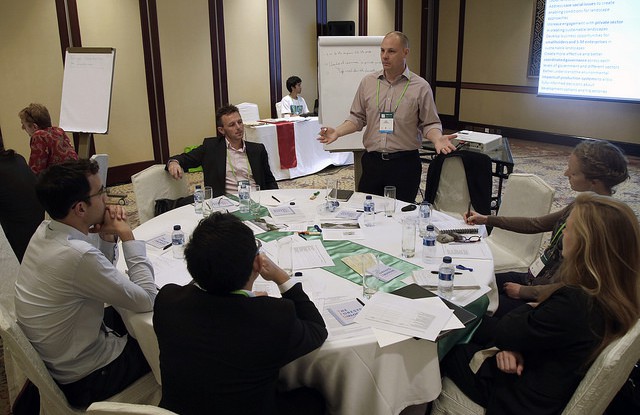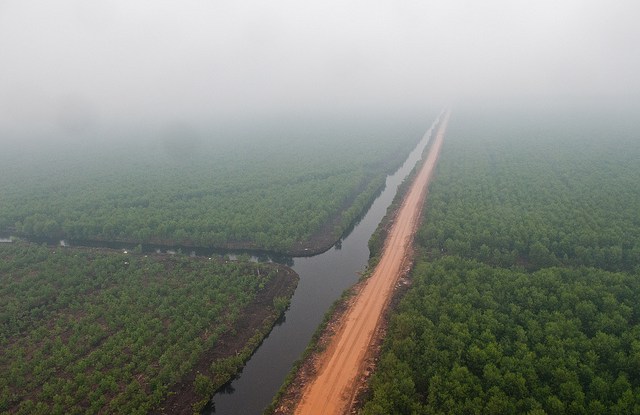
As the links between tropical forests and food security have become ever clearer in recent years, experts at a recent conference pointed to an example of expanded dialogue to alleviate the drivers of deforestation that threaten food security in many forest communities.
Recent research by the Center for International Forestry Research (CIFOR) has highlighted the contributions that forest-based foods make to nutrition in rural communities. In the face of competing land-use demands, many forests in Southeast Asia are being lost to extractive or agricultural activities.
These topics were central to discussions at the Forests Asia Summit in Jakarta in May.
“Children who live in areas with more tree cover have more diverse and nutritious diets, and this holds independent of income level,” said Simran Sethi, an Associate at the Melbourne Sustainable Society Institute of the University of Melbourne, citing research that found a positive correlation between nutrition and forest cover.
Biodiversity from natural ecosystems serves two crucial functions for food systems, according to David Cooper, Director for the Scientific, Assessments and Monitoring Branch at the Convention on Biological Diversity (CBD). The first is to provide nutrient-dense products that are crucial for local populations, such as high-antioxidant fruits, or iron-rich bushmeat. The second is to provide ecosystem services crucial to food production, such as habitat for insects that pollinate food crops, or water retention and purification.
These functions are under threat from widespread land-use change, as forests are degraded or cleared in pursuit of resources and profits, attendees at the conference agreed.
In forest communities that had converted their natural forests to cultivate palm oil, government surveys found that after a fall in price of palm oil, those communities had become comparatively food-insecure, explained Lesley Potter from the Crawford School of Public Policy at Australia National University. “Surprisingly maybe, Sanggau [in West Kalimantan, Indonesia], with the most rubber and the most oil palm, was also one of the most food-insecure,” Potter said. This community and others like it had not been food-insecure prior to shifting to palm oil cultivation, she said.
Cooper told a high-level panel at the Summit: “We will only succeed in conserving biodiversity and conserving the forest if we also take care of people’s livelihood needs and their socio-economic aspirations, and this means we do have to recognize there will be competing demands for land use.”
Balancing these demands requires recognition and dialogue, panelists agreed, but questions about what form that dialogue takes, and who should be a part of it, remain elusive.
“How do we ‘do’ the landscapes of the conversations we need to have? How do we decide who needs to be in the room?” asked panelist David Carden, Partner-in-Charge of Asia for Jones Day and a former U.S. Ambassador to ASEAN.
The need for private-sector actors to participate in more multi-stakeholder dialogue — for the purposes of ensuring sustainable land-use practices, among others — was one of the top subjects of discussion throughout the Forests Asia Summit. Cautioning that more powerful players were still acting only in their own interests, Carden spoke of the need to find the right players to join with.
“We are all prisoners of our own lenses,” he said. “We need to build the alliances to win the future.”
Participants from The Forests Dialogue’s field conversation on Food, Fiber, Fuel and Forests in Indonesia presented one example of a useful multi-stakeholder dialogue. The Forests Dialogue (TFD) could offer key lessons for practitioners looking to bridge the gaps between sectors.
We need to close the gap between research outputs and policymaking, and that is a communications problem
The Forest Dialogue is seeking to build the very alliances Carden called for, bringing a wide range of stakeholders to the table to address sustainable forest management systems. Born out of a series of meetings in the 1990s that included international industry groups, NGOs, the World Bank, and private forest owners, TFD — now based at Yale University — conducts interactive multi-stakeholder dialogues around the world.
“The idea behind The Forests Dialogue is to create a platform and process for stakeholders that care about forests to discuss the challenging issues to build trust, to share information and ultimately to help change some of the challenges that we see in the forest sector,” explained Gary Dunning, Executive Director of The Forests Dialogue, at a discussion forum at the Forests Asia Summit.
In March 2014, TFD held a field dialogue in Central Kalimantan, Indonesia, as part of a collaboration with CIFOR called the 4Fs Initiative — the four “Fs” being food, fuel, fiber and forests.
“The 4Fs initiative grew out of the challenge that our steering committee identified of what we’re calling the pressurized intersection of food, fuel, fiber and forests over the next 20 to 40 years,” Dunning explained. “It is about how do we approach a more integrated landscape decision-making process.”
At the Summit, much was said about mixing more sustainable practices with profitable forestry-based industries, such as oil palm plantations. “Can we plan for more diversity in oil palms? Or for mixed livelihoods?” said the CBD’s Cooper during the high-level discussion panel.
To these questions, TFD may offer a formula for finding a middle ground, according to Dunning, as it provides opportunities for isolated groups to listen to each other.
“Having the private sector engaged … at a table that has other stakeholders there as well is absolutely essential,” he said.
Some at Forests Asia were complimentary about the March dialogue. “Being with people from other sectors really opened my mind that this is indeed a complex issue; palm oil is only one part of this broad context,” said Desi Kusumadewi, Indonesia Director of the Roundtable on Sustainable Palm Oil (RSPO), an organization that promotes certifiably sustainable palm oil.
Others were more critical.
Oeban Hadjo from the Community-Based Forest Management System Working Group said he was disappointed that the dialogue was not able to address all of the many other challenges that local communities face.
“We did see examples of community forest and small-scale production,” he said. “For the future, our biggest concern is that some of the areas that are designated for conversion from forest to plantation are areas that the local communities are using for food sources.”
TFD’s approach, however, provided a step forward from the status quo: In years past, if companies, government representatives and local communities met at all, it was often as adversaries.
The dialogue also helped to identify gaps and open up areas for future collaboration — while finding entry points for drawing on existing research to inform policy.
“There is a gap between knowledge and inputs for policy,” said Putera Parthama, Senior Adviser to the Indonesian Minister of Forestry on Economic Affairs and International Trade, and a panelist at the Forests Asia Summit. “We need to close the gap between research outputs and policymaking, and that is a communications problem.”
We want you to share Forests News content, which is licensed under Creative Commons Attribution-NonCommercial-ShareAlike 4.0 International (CC BY-NC-SA 4.0). This means you are free to redistribute our material for non-commercial purposes. All we ask is that you give Forests News appropriate credit and link to the original Forests News content, indicate if changes were made, and distribute your contributions under the same Creative Commons license. You must notify Forests News if you repost, reprint or reuse our materials by contacting forestsnews@cifor-icraf.org.

